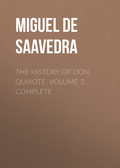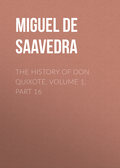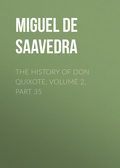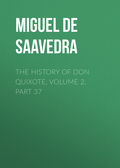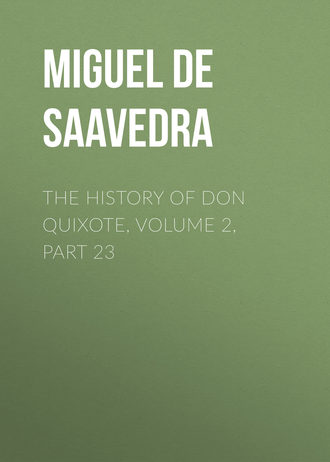
Мигель де Сервантес Сааведра
The History of Don Quixote, Volume 2, Part 23
"I remember no such article, Sancho," said Don Quixote; "and even if it were so, I desire you to hold your tongue and come along; for the instruments we heard last night are already beginning to enliven the valleys again, and no doubt the marriage will take place in the cool of the morning, and not in the heat of the afternoon."
Sancho did as his master bade him, and putting the saddle on Rocinante and the pack-saddle on Dapple, they both mounted and at a leisurely pace entered the arcade. The first thing that presented itself to Sancho's eyes was a whole ox spitted on a whole elm tree, and in the fire at which it was to be roasted there was burning a middling-sized mountain of faggots, and six stewpots that stood round the blaze had not been made in the ordinary mould of common pots, for they were six half wine-jars, each fit to hold the contents of a slaughter-house; they swallowed up whole sheep and hid them away in their insides without showing any more sign of them than if they were pigeons. Countless were the hares ready skinned and the plucked fowls that hung on the trees for burial in the pots, numberless the wildfowl and game of various sorts suspended from the branches that the air might keep them cool. Sancho counted more than sixty wine skins of over six gallons each, and all filled, as it proved afterwards, with generous wines. There were, besides, piles of the whitest bread, like the heaps of corn one sees on the threshing-floors. There was a wall made of cheeses arranged like open brick-work, and two cauldrons full of oil, bigger than those of a dyer's shop, served for cooking fritters, which when fried were taken out with two mighty shovels, and plunged into another cauldron of prepared honey that stood close by. Of cooks and cook-maids there were over fifty, all clean, brisk, and blithe. In the capacious belly of the ox were a dozen soft little sucking-pigs, which, sewn up there, served to give it tenderness and flavour. The spices of different kinds did not seem to have been bought by the pound but by the quarter, and all lay open to view in a great chest. In short, all the preparations made for the wedding were in rustic style, but abundant enough to feed an army.
Sancho observed all, contemplated all, and everything won his heart. The first to captivate and take his fancy were the pots, out of which he would have very gladly helped himself to a moderate pipkinful; then the wine skins secured his affections; and lastly, the produce of the frying-pans, if, indeed, such imposing cauldrons may be called frying-pans; and unable to control himself or bear it any longer, he approached one of the busy cooks and civilly but hungrily begged permission to soak a scrap of bread in one of the pots; to which the cook made answer, "Brother, this is not a day on which hunger is to have any sway, thanks to the rich Camacho; get down and look about for a ladle and skim off a hen or two, and much good may they do you."
"I don't see one," said Sancho.
"Wait a bit," said the cook; "sinner that I am! how particular and bashful you are!" and so saying, he seized a bucket and plunging it into one of the half jars took up three hens and a couple of geese, and said to Sancho, "Fall to, friend, and take the edge off your appetite with these skimmings until dinner-time comes."
"I have nothing to put them in," said Sancho.
"Well then," said the cook, "take spoon and all; for Camacho's wealth and happiness furnish everything."
While Sancho fared thus, Don Quixote was watching the entrance, at one end of the arcade, of some twelve peasants, all in holiday and gala dress, mounted on twelve beautiful mares with rich handsome field trappings and a number of little bells attached to their petrals, who, marshalled in regular order, ran not one but several courses over the meadow, with jubilant shouts and cries of "Long live Camacho and Quiteria! he as rich as she is fair; and she the fairest on earth!"
Hearing this, Don Quixote said to himself, "It is easy to see these folk have never seen my Dulcinea del Toboso; for if they had they would be more moderate in their praises of this Quiteria of theirs."
Shortly after this, several bands of dancers of various sorts began to enter the arcade at different points, and among them one of sword-dancers composed of some four-and-twenty lads of gallant and high-spirited mien, clad in the finest and whitest of linen, and with handkerchiefs embroidered in various colours with fine silk; and one of those on the mares asked an active youth who led them if any of the dancers had been wounded. "As yet, thank God, no one has been wounded," said he, "we are all safe and sound;" and he at once began to execute complicated figures with the rest of his comrades, with so many turns and so great dexterity, that although Don Quixote was well used to see dances of the same kind, he thought he had never seen any so good as this. He also admired another that came in composed of fair young maidens, none of whom seemed to be under fourteen or over eighteen years of age, all clad in green stuff, with their locks partly braided, partly flowing loose, but all of such bright gold as to vie with the sunbeams, and over them they wore garlands of jessamine, roses, amaranth, and honeysuckle. At their head were a venerable old man and an ancient dame, more brisk and active, however, than might have been expected from their years. The notes of a Zamora bagpipe accompanied them, and with modesty in their countenances and in their eyes, and lightness in their feet, they looked the best dancers in the world.
Following these there came an artistic dance of the sort they call "speaking dances." It was composed of eight nymphs in two files, with the god Cupid leading one and Interest the other, the former furnished with wings, bow, quiver and arrows, the latter in a rich dress of gold and silk of divers colours. The nymphs that followed Love bore their names written on white parchment in large letters on their backs. "Poetry" was the name of the first, "Wit" of the second, "Birth" of the third, and "Valour" of the fourth. Those that followed Interest were distinguished in the same way; the badge of the first announced "Liberality," that of the second "Largess," the third "Treasure," and the fourth "Peaceful Possession." In front of them all came a wooden castle drawn by four wild men, all clad in ivy and hemp stained green, and looking so natural that they nearly terrified Sancho. On the front of the castle and on each of the four sides of its frame it bore the inscription "Castle of Caution." Four skillful tabor and flute players accompanied them, and the dance having been opened, Cupid, after executing two figures, raised his eyes and bent his bow against a damsel who stood between the turrets of the castle, and thus addressed her:




